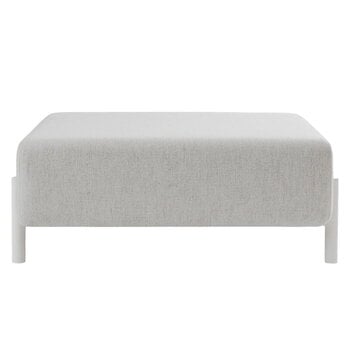Hem’s Palo ottoman boasts an understated, Nordic minimalist design based on simple geometric shapes and classic wool upholstery. Despite its clean-lined appearance, however, the footstool is anything but boring: the contrast between the exposed slender legs and the deep seat makes it distinctively playful. The Palo ottoman is extremely easy to assemble and can also be complemented with a fun side table that is available separately.
Palo ottoman, chalk
Hem
Description
Hem’s Palo ottoman boasts an understated, Nordic minimalist design based on simple geometric shapes and classic wool upholstery. Despite its clean-lined appearance, however, the footstool is anything but boring: the contrast between the exposed slender legs and the deep seat makes it distinctively playful. The Palo ottoman is extremely easy to assemble and can also be complemented with a fun side table that is available separately.
Product details (13)
- Colour
- Chalk, white
- Width
- 100 cm
- Depth
- 95 cm
- Height
- 39 cm
- Seat height
- 39 cm
- Frame material
- Wood
- Seat cushion
- PU foam
- Upholstery fabric
- Amdal by GU (Norway): 70% virgin wool, 30% viscose
- Abrasion resistance
- 100,000 Martindale
- Pilling
- 4
- Lightfastness
- 5-7
- Base material
- Powder coated metal, Pure White (RAL 9010)
- Warranty
- 3 years
- Product ID
Reviews (0)
Sustainability
The Product Sustainability Framework, our criteria of sustainable design, helps you find the most sustainable products in our selection. Read below which sustainability criteria this product has met.
Working conditions & labour 8/9
-
Equal opportunities for all employees
-
Commitment to UN Global Compact, fair compensation for all employees
-
Corporate responsibility requirements defined and communicated for suppliers
-
Systematic work for improved inclusion and well-being in the workplace
-
Transparent supply chain
-
Suppliers' compliance to a code of conduct ensured
-
Compliance to the UN Guiding Principles on Business and Human Rights ensured in the supply chain
-
Support for community involvement in the supply chain
Eco-friendly production 8/9
-
Fair and resource-wise water-use in production
-
No incineration or landfilling of returned items
-
No use of endangered species as materials
-
No direct environmental emissions or waste (excl. GHGs) from production
-
The sustainability of direct suppliers' production is addressed and monitored
-
Production and material sourcing that respect biodiversity, animal rights, and natural ecosystems
-
Material-efficient and ecological packaging
-
No potentially harmful chemicals used in own production
Climate impact 4/8
-
Company's direct greenhouse gas emissions identified and commitment to reduction
-
Product's carbon impact identified and commitment to reduction
-
Guidance on energy- and eco-efficient use of the product
-
100 % renewable energy in own production and operations
Sustainable materials 4/6
-
Sustainable and long-lasting material choices
-
No harmful or hazardous substances
-
Responsible raw material sourcing and production
-
Materials suited for circularity: monomaterials, recyclable finishings, renewable or recycled contents etc.
Circular design 4/5
-
High aesthetic quality promoting long-term use of the product
-
Technically durable product design and material choices
-
Design for enduring life-long quality
-
Design and support for product maintenance, repair and upgradability




